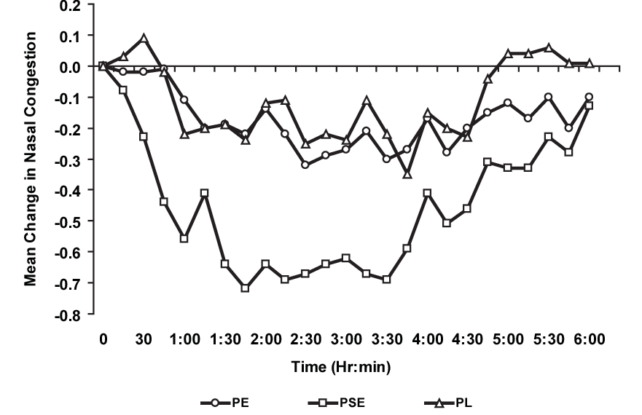ARTICLE AD
Sudafed, Mucinex, Benadryl, Advil, Tylenol, Vicks, and Dimetapp.
These popular brand names appear on oral decongestants that are staples of the cold and flu aisle in American drug stores, and yet many contain an ingredient that does not work as promised.
The US Food and Drug Administration (FDA) has now proposed an order to remove oral phenylephrine from every single cold, cough, allergy, bronchodilator, and anti-asthmatic drug product available today, roughly four-fifths of all oral decongestants.
The proposal is now open for public comment, and, if finalized, the ruling would dramatically reshape the drug formulations seen in hundreds of over-the-counter oral decongestants available for purchase in the country – a market share worth roughly US$1.76 billion in 2022.
Popular products impacted by the proposal would include Advil Sinus Congestion & Pain, Sudafed PE Nasal Decongestant, Vicks DayQuil and NyQuil, and Tylenol Cold & Flu Severe, just to name a mere few.
The proposed order comes a year after an independent advisory body for the FDA unanimously concluded that while oral phenylephrine is safe to consume, it is no better than a placebo at clearing a stuffy nose.
For nearly two decades now, some scientists have called for the removal of oral phenylephrine from the market. The last time the FDA reviewed the medicine, however, it kept the drug on shelves.
"It is the FDA's role to ensure that drugs are safe and effective," says Patrizia Cavazzoni, director of the administration's Center for Drug Evaluation and Research (CDER).
"Based on our review of available data, and consistent with the advice of the advisory committee, we are taking this next step in the process to propose removing oral phenylephrine because it is not effective as a nasal decongestant."
 Mean change in subjective nasal congestion scores at 15-minute intervals after administration of phenylephrine (PE), pseudoephedrine (PSE), and a placebo (PL). (Horak et al., Annals of Allergy, Asthma & Immunology, 2009)
Mean change in subjective nasal congestion scores at 15-minute intervals after administration of phenylephrine (PE), pseudoephedrine (PSE), and a placebo (PL). (Horak et al., Annals of Allergy, Asthma & Immunology, 2009)To understand how so much of the drug market came to be dominated by a useless decongestant, it's necessary to look back at the history of cold and flu meds.
Phenylephrine was first approved by the FDA as a safe and effective decongestant in 1976, based on mostly industry-funded studies that have since been criticized for their methodology.
Before 2006, pseudoephedrine was the main ingredient in over-the-counter decongestants. In the early 2000s, a federal law called for states to have comprehensive measures in place to control the drug's sale thanks to concerns it was being used in the manufacture of methamphetamine.
Since then, local laws have either required a prescription for medicines containing pseudoephedrine, or have limited amounts that can be sold from behind the counter.
After this ruling, over-the-counter decongestants in drug stores, grocery stores, and convenience stores nationwide had their pseudoephedrine replaced with phenylephrine.
In 2005, some scientists reviewed existing evidence that showed phenylephrine was ineffective at de-clogging the nose when taken orally at the advised dosage.
In 2007, a citizen's petition asked the FDA to require better proof of efficacy. At the time, however, officials at the administration called for more research on higher dosages.
Starting in 2015, clinical trials tried quadrupling the dosage of oral phenylephrine, but the medicine still proved useless as a decongestant, prompting another citizen's petition to remove these products from the market.
Now, after years of debate, the agency has been swayed by overwhelming evidence. Last year, the FDA committee analyzed three large clinical trials that show oral phenylephrine is not effective at any dose.
Studies show that even when swallowed in higher doses, almost no medicine reaches the nasal passages. It is mostly broken down in the gut.
The proposed order to remove phenylephrine from oral decongestants does not apply to nasal sprays or eye drops. These products deliver the same drug in a way that is more effective than an oral tablet.
But most consumers aren't aware of those differences. In 2022, more than 242 million cold remedy products containing phenylephrine were sold in the US – more than four times as many as those containing pseudoephedrine.
Being a proposed order, the FDA isn't requiring companies to do anything yet. They are, however, on notice for further action, which will soon require them to withdraw products that contain phenylephrine as the sole active ingredient.
A list of oral decongestants containing phenylephrine can be found here.

 2 months ago
37
2 months ago
37 

